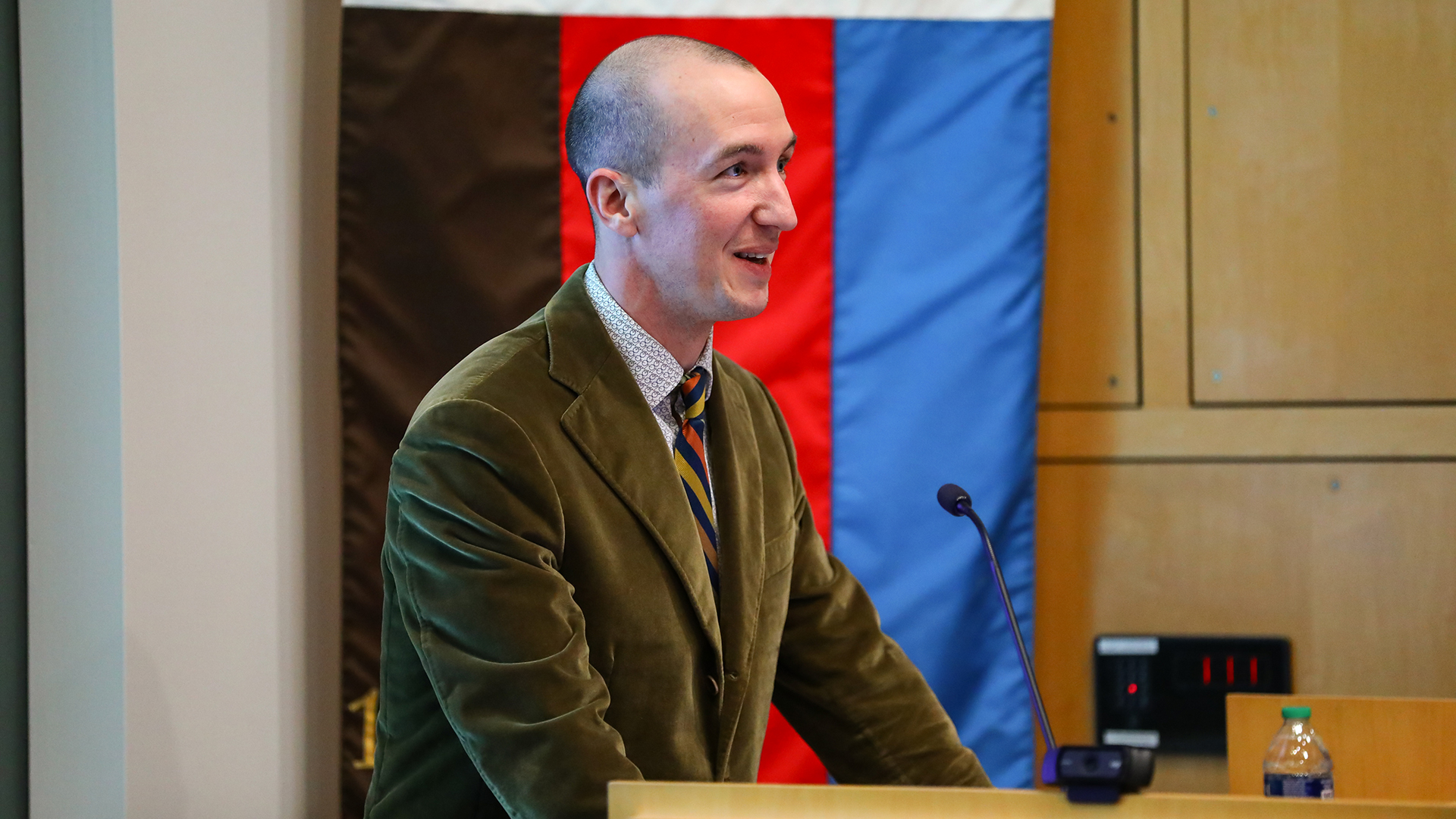
Henry Grabar speaks at the Bloustein School’s Meck Memorial Lecture on December 6, 2023.
“Today, we’re talking about what I think to be one of society’s most divisive and provocative subjects, which is parking,” began Henry Grabar, journalist and Loeb Fellow, Harvard University Graduate School of Design.
As the speaker for the Bloustein School’s Stuart A. Meck Memorial Lecture in Land Use Law and Affordable Housing on December 6, Mr. Grabar explored the emotional attachment people have to parking spaces, citing anecdotes and the importance placed on those spaces, even to the point of deadly disputes.
Mr. Grabar touched on the historical context of the parking problem, which dates back to the invention of the first automobiles. As car use became more common in the 1920s there was a surge in traffic issues, with parking identified as a critical problem – people looking for parking, and people double and triple parking when they couldn’t find spaces.
By the end of World War II, an Urban Land Institute report concluded that parking was the most important single problem facing the central business districts of large cities of the day. Cities responded by building parking lots and requiring all properties to have their own parking, leading to a shift in building practices to include mandatory parking.
It also led to nearly every city and town adopting complex codes dictating how many parking spots are for specific uses, from apartment buildings and schools to donut shops, nail salons, laundromats, and funeral homes. New Brunswick code, he said as an example, requires, “one-point-five spaces for every two chairs in a barber shop, two spaces for every examination room in a kennel facility plus one per employee, one space for every 250 square feet of laundromat, and …a funeral home requires a space for every 50 feet of viewing room plus one for employee.”
The result of these parking requirements created so much parking that most people never have to pay to park, and few people only spend more than a few seconds finding a parking spot in almost any city in America. Despite the perceived parking shortage in some areas, he noted that there actually is an oversupply of parking spaces across the U.S.
Highlighting several major U.S. cities and their parking oversupply percentages in a graph, Mr. Grabar contends that the expectation of free and convenient parking has hindered the sensible management of this resource. Laws aimed at ensuring ample parking for all new developments are making more housing expensive, buildings less aesthetically pleasing, and damaging the environment.
“Required parking adds tens of thousands of dollars onto the cost of every single American home, imposing a half-a-billion-dollar penalty annually on tenants who don’t drive. And for every completed building with a bunch of parking included,” he continued, “there is a blueprint for an unbuilt structure that didn’t pencil out.” He went on to explain that the production of multifamily housing like brownstones fell more than 90% between 1971 and 2021. Today, there is more land use for storing each car than there is for housing each person. This has made affordable housing more tenuous.
Architecture has also suffered as parking laws evolved. The vintage image of “American Main Street” is long gone with new parking requirements, as commercial storefronts need to provide a parking spot for every 250 square feet of interior space. Under these guidelines, a new drugstore may have half of its lot as parking. A two-story shop would require three-quarters of the parcel to be parking. For a storefront with a suite of offices above, the footprint of the building shrinks to barely more than a quarter of the lot.
He followed up saying, “All this required parking is a dish that makes us hungry for more parking. And that’s because parking forces us to drive more. And the more we drive, the more parking we crave.” With data showing the relationship between parking growth and increased car use, he explained that the provision of free parking encourages more driving. This further contributes to traffic congestion and makes it more difficult to run an efficient mass transit system to the extent that walking, biking, or mass transit becomes difficult, dangerous, or impractical.
He also acknowledged the negative effects on the environment. Driving has made transportation the largest source of greenhouse gas emissions. Increased impervious surfaces of parking lots have removed natural open areas, leading to increased stormwater flooding while also decreasing groundwater replenishment. Parking is also a huge contributor to the urban heat island effect.
While emphasizing the importance of managing parking effectively, Mr. Grabar included examples of successful parking management strategies. He pointed out that Philadelphia leadership has realized it doesn’t make sense to require parking for new homes or the addition of three or four new businesses. Following the lead of Connecticut and Buffalo, NY, who repealed their parking minimums five years ago, the reform has gained momentum. Most recently Austin, Texas – which he pointed out is not yet very transit-friendly – became the largest U.S. city to repeal their parking requirements entirely.
“This is a reform that really cuts across political and urbanist preconceptions that you might have about places,” he said. He explained that housing gets cheaper to build and different types of housing become possible. When Miami relaxed parking minimums a few years ago, for example, small townhouse developments began to prop up in some of the city’s core neighborhoods.
Mr. Grabar concluded the discussion with the idea of focusing on the demand for parking, rather than the supply. He highlighted the potential benefits of parking reforms, including increased walkability, improved public spaces, and a reduction in traffic congestion. Finally, he encouraged those in the planning profession to experiment with different parking policies to create more vibrant and sustainable urban environments.



